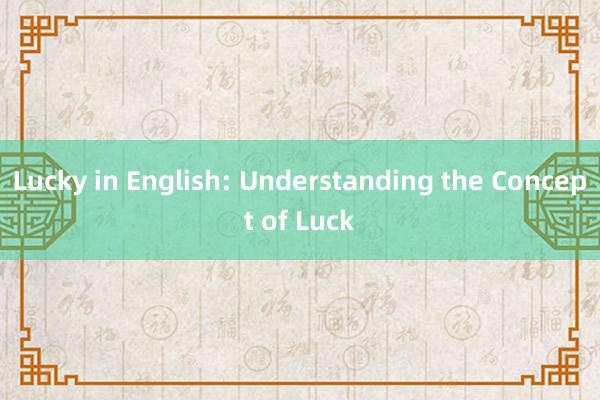时间:2024-09-06 20:08

### Lucky in English: Understanding the Concept of Luck
In the English language, the concept of "luck" is a multifaceted and intriguing topic that encapsulates both chance and fortune. It is a word that can evoke feelings of hope, despair, and even envy, depending on its context. To truly understand the concept of luck within the English language, we must explore its various nuances and applications.
#### Chance and Probability
At its core, "luck" often refers to chance or probability, the unpredictable outcomes that can influence our lives. This notion is closely tied to the idea of fate versus free will, with luck often seen as an external force that can either enhance or hinder our opportunities. For example, saying "I had a lucky break" implies that an unexpected opportunity came my way, perhaps due to serendipity rather than deliberate effort.
#### Good and Bad Luck
English distinguishes between "good luck" and "bad luck," reflecting a cultural appreciation for the duality of chance. Good luck is associated with positive outcomes, 南通联发天翔印染有限公司 such as success, 生活足迹笔记本 happiness,海口市麦锦汇百货店 or financial prosperity. Conversely, bad luck is linked to negative events, like misfortune, failure,锦泰中文小说网 - 网络小说排行榜 or accidents. These terms not only highlight the importance of luck in personal narratives but also underscore the emotional impact of chance events.
#### Luck vs. Skill
The concept of luck in English also involves a philosophical debate about whether success is more a product of skill or mere chance. Phrases like "practice makes perfect" emphasize the role of skill and hard work, while acknowledging that luck can play a significant role in achieving success. This distinction is crucial in discussions about talent, sports, and business, where some argue that exceptional results are more often a result of innate ability (skill) than random chance (luck).
#### Cultural Interpretations
Across different cultures, the interpretation of luck varies significantly. In English-speaking societies, luck is often viewed through a lens of superstition and folklore, with sayings like "when it rains, it pours" or "the early bird catches the worm." These idioms reflect the belief that certain actions or conditions can influence the flow of luck. Additionally, phrases like "knock on wood" serve as a symbolic gesture against bad luck, illustrating how cultural practices intertwine with the concept of luck.
#### Conclusion
Understanding the concept of luck in English is about recognizing its multifaceted nature. It encompasses both chance and probability锦泰中文小说网 - 网络小说排行榜, good and bad outcomes, and the complex interplay between skill and serendipity. Through idioms, sayings, and cultural practices, the English language reflects a deep-seated fascination with the unpredictable forces that shape our lives. Whether we seek to embrace luck as a positive force or view it with caution, the concept remains a fundamental part of our shared human experience.